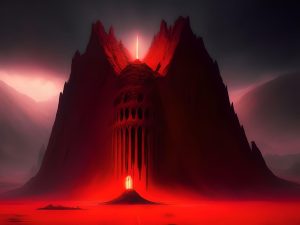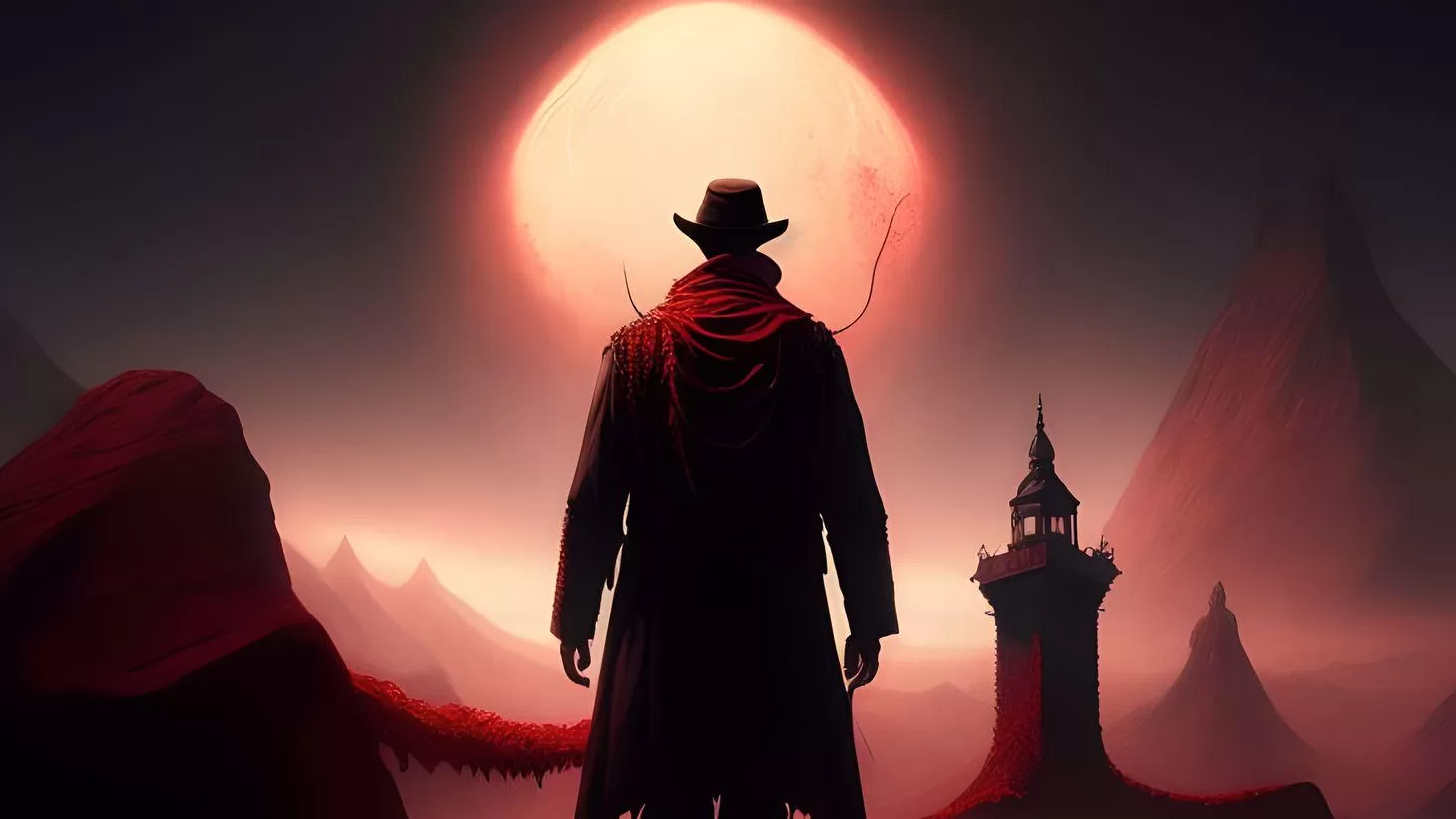Of unutterable nightmares and titanic landscapes, no story more truly portrays the catastrophic termination of man than the late Cormac McCarthy’s masterwork Blood Meridian. It holds eerie echoes to the cosmic dread espoused by that distinct visionary Howard Phillips Lovecraft, whose prose seeks the shiver from inexpressible primal fears, a mere mirror of man’s triviality in a universe extensive beyond understanding.
Blood Meridian, ostensibly, recounts the ruthless exploits of the Glanton gang as they rampage across the Southwestern United States and Northern Mexico during the mid-nineteenth century. Yet, beneath this gore-streaked facade, it conveys a Lovecraftian sense of doom, an apocalyptic harbinger whispered in its every line. This awful sensation, comparable to that evoked by Lovecraft’s “The Call of Cthulhu,” forges an atmosphere of an impending chaos unleashed: “The time would be easy to know, for then mankind would have become as the Great Old Ones; free and wild and beyond good and evil, with laws and morals thrown aside and all men shouting and killing and revelling in joy.” McCarthy’s unforgiving Southwest desert might just be another realm of R’lyeh, the sunken city where the Great Old Ones slumber, pregnant with prehistoric horrors.

“See the child,” McCarthy initiates, instantly rendering the reader a spectator of the apocalypse, much like Lovecraft’s ill-fated protagonists, witnessing their own inexorable demise. Just as the hideous monoliths and non-Euclidian towers of Lovecraft’s alien landscapes dwarf mankind’s greatest achievements, so too does the terrifyingly grand desolation of the desert diminish all human concerns.
In the relentless march of its grim adventure, the Glanton gang encounters a luckless party, the line of demarcation between civilization and wilderness lost in the blurring desert heat. A brutal ballet of death unfurls in the dust, where the Glanton gang descends upon the unsuspecting souls like the ghastly creatures of night descending upon the lamb to the slaughter.
One individual, of surly countenance and eyes which hold the dire burden of his deeds, seizes his quarry. The vile spectacle that ensues bears semblance to the perverse rites performed in the black heart of Lovecraft’s Innsmouth, revealing the monstrous within the human. His hands, weathered tools of terror, seize the scalp of the victim with a harsh certainty. In this ritual, the members of the Glanton gang have become curses of the vengeful desert, older than man and wider than the world.
With nauseating ease born of morbid familiarity, the man begins his work. The blade, sparkling under the pitiless sun like a fragment of madness, rips into flesh with a sickening sound that reverberates across the barren plains. As the skin separates, revealing the grotesque intimacy of mortality beneath, the observer cannot escape the memory of Lovecraft’s admonition: “Bunch together a group of people deliberately chosen for strong religious feelings, and you have a practical guarantee of dark morbidities expressed in crime, perversion, and insanity.”
The Glanton gang emerges not as devout adherents to a known faith but as twisted disciples of a nihilistic creed. Their devotion to this dark doctrine, a pact sealed in blood and violence, is a horrific parody of religious zealotry. Subscribing not to celestial divinities but to the palpable might of brutality, their philosophic musings and relentless pursuit of scalps become a grotesque rite, an unhallowed sacrament, binding them in a demented fellowship.
This motley assembly, bearing a disquieting resemblance to a congregation, is bound in a perverse unity by their shared faith in the orations of their monstrous prophet, Judge Holden. With each act of violence, they perform a blasphemous liturgy, their scalps serving as oblations on the altar of their god of war. In this way, the journey of the Glanton gang into the bleak pit of human psyche demonstrates the shocking potential for unchecked conviction to spiral into monstrous extremes.
Blood gushed forth, akin to the nightmarish eruptions in the skies of Lovecraft’s dying worlds, soaking the man’s hands in a damning testament of his deed. The victim, eyes wide with the shocking realization of his final fate, mirrored the unspeakable shrinking of sanity that haunted Lovecraft’s protagonists when they witnessed the profane truth of existence.
The scalp, once a part of a living, thinking entity, was reduced to a mere trophy, a physical proof of dominance. It was a reminder of Lovecraft’s cosmic horror, the devaluation of life and its inherent fragility, an offspring of “The Colour Out of Space,” where madness and death emerge “from realms whose mere existence stuns the brain and numbs us with the black extra-cosmic gulfs it throws open before our frenzied eyes.”
Thus, the heinous operation was completed, the act of scalping executed with a pacifying pragmatism, leaving a painting of fright stark against the vast bleakness of the desert, a scene as horrifyingly surreal as a passage from the Necronomicon. This repugnant ritual, performed in the throes of the Glanton gang’s journey, stands as a testament to the depths mankind can plunge into, revealing an unsettling reflection of the monstrous entities that lurk within the shadows of Lovecraft’s cosmos.
“Whatever in creation exists without my knowledge exists without my consent.” The Judge’s words draw parallel to Lovecraft’s cosmicism – the notion that human beings are insignificant in the grand cosmic scheme. This Lovecraftian terror is not the simple dread of the unknown but the dawning grasp of our utter inconsequence. One could undoubtedly argue with confidence that man must be prepared to accept notions of the cosmos and of his own place in the seething vortex of time, whose merest mention is paralyzing.
The indelible impact of Blood Meridian lies not in its gruesome depictions of violence but in the philosophical underpinning of savagery. The Judge’s conclusion that “war is god” is Lovecraftian in its nihilism. The reduction of all existence to conflict matches Lovecraft’s concept of hostile gods and entities that exist beyond the bounds of human morality – unfathomable and terrifying. The blind gods are deaf to our prayers and will be deaf to our cries.
In “The Call of Cthulhu,” Lovecraft writes, “The most merciful thing in the world, I think, is the inability of the human mind to correlate all its contents. We live on a placid island of ignorance in the midst of black seas of infinity, and it was not meant that we should voyage far.” This clearly reflects the uncaring cosmos, where man’s existence or extermination matters not.
Judge Holden, an antithesis of everything human, shares an affinity with Lovecraft’s monsters, embodying a cosmic Old One himself. “He never sleeps, the judge. He is dancing, dancing. He says that he will never die.” His amoral philosophies and inhuman longevity are reminiscent of the nausea-inducing Nyarlathotep, the Crawling Chaos, who in Lovecraft”s “Nyarlathotep” stands as the monstrous soul of antiquity, becoming one with the pandemonium around him: “And it was then that Nyarlathotep came out of Egypt. Who he was, none could tell, but he was of the old native blood and looked like a Pharaoh. The fellahin knelt when they saw him, yet could not say why. He said he had risen up out of the blackness of twenty-seven centuries, and that he had heard messages from places not on this planet.”

The finality of apocalypse in Blood Meridian is as subtle and inevitable as Lovecraft’s doomed worlds. The end does not arrive with a deafening crash, but rather, it seeps into the fabric of reality, an unseen corrosion. The boy, now the man, “moved with a great shambling gait, his head sunk on his chest, like a man goaded toward extinction.”
The terror of Blood Meridian lies not within the grotesque violence of the Glanton gang but rather in the cognizance of our impending demise, a theme highlighted in the Lovecraftian finale where “[m]ankind would have become as the Great Old Ones; free and wild and beyond good and evil, with laws and morals thrown aside and all men shouting and killing and revelling in joy.”
Just as in At the Mountains of Madness, Lovecraft’s human explorers stumble upon an alien city, evidence of an ancient, superior race and the insignificance of man’s reign, so does the “man” at the end of Blood Meridian meet an inexplicable horror in the outhouse, an indistinct yet palpable sign that the end of the world was already nigh a hundred and fifty years ago. “He never sleeps,” the reader is reminded once again of the Judge, the symbol of mankind’s Last Judgment, “He says he will never die.”
The cacophony of the saloon, with the dance that “moved with a will,” symbolizing mankind’s inability to control its fate, draws similarities to Lovecraft’s haunting depiction of the primal dance in “The Festival,” where the participants move with an alien rhythm that transcends human understanding. The “man’s” hollow gaze reflects a shocking revelation of cosmic horror, akin to the conclusion of Lovecraft’s “The Shadow Over Innsmouth,” where the protagonist discovers his monstrous lineage and inevitable fate. “He looked as if he’d been snatched from the brink of the void,” Lovecraft could have informed us with his uncanny knack for bringing the reader to the edge of the abyss, only to recoil aghast at the revelation of what lies beyond.
In the concluding sentence of Blood Meridian, the reader is left with the specter of the Judge, dancing, playing his fiddle, and declaring his immortality, a monstrous incarnation of doomsday itself. “And they say the wind does not have a name,” the legends of the Hopi Indians tell us, a reminder of Lovecraft’s pervasive theme of nameless phantoms that engulf mankind.








Personally, I like Lovecraft!